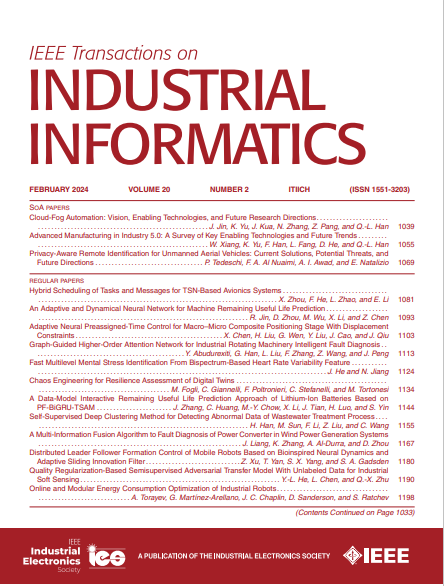基于GAN的联邦智能工厂数据驱动网络物理异常检测
IF 9.9
1区 计算机科学
Q1 AUTOMATION & CONTROL SYSTEMS
引用次数: 0
摘要
智能工厂中无线联网多机器人系统(MRS)的弹性运行依赖于对机器人的物理异常和无线传输错误或不精确人工智能决策的网络异常的有效检测,这导致了数据驱动工业信息学的新技术前沿:网络物理异常检测(AD)。此外,单个智能工厂的数据模式不太可能足以为这种新的网络物理AD训练高质量的学习模型,这表明有必要利用来自多个智能工厂的运营数据,同时保持每个工厂数据的隐私。为了克服上述智能工厂中网络物理AD的技术挑战,本文提出了生成对抗网络、联邦学习和模糊聚类加速的集成机制。生成对抗网络促进数据输入以生成完整的数据集,减轻无线通信引起的异常。联邦学习允许在多个协作工厂之间联合使用丰富的隐私保护数据集。此外,嵌入模糊聚类加速,加快选厂算法,实现多智能工厂大规模运行时的高效训练和实时物理AD。基于KDD-99数据集的大量计算实验证明了协作多智能工厂中无线联网MRS的有效和高效的网络物理AD。本文章由计算机程序翻译,如有差异,请以英文原文为准。
Data-Driven Cyber-Physical Anomaly Detection With GAN in Federated Smart Factories
Resilient operation of a wireless networked multirobot system (MRS) in a smart factory relies on the effective detection of physical anomalies from robots and cyber anomalies from wireless transmission errors or imprecise artificial intelligence decisions, which leads to a new technological frontier in data-driven industrial informatics: cyber-physical anomaly detection (AD). Furthermore, data patterns in a single smart factory are unlikely enough to train high-quality learning models for this new cyber-physical AD, which suggests the necessity to utilize operating data from multiple smart factories while keeping the privacy of each factory's data. To overcome the aforementioned technical challenges for cyber-physical AD in smart factories, this article proposes an integral mechanism of generative adversarial networks, federated learning, and fuzzy clustering acceleration. Generative adversarial networks facilitate data imputation to regenerate complete datasets alleviating anomalies caused by wireless communications. Federated learning enables rich privacy-preserving datasets to be jointly used among multiple collaborative factories. Furthermore, fuzzy clustering acceleration is embedded to speed up the factory selection algorithm such that efficient training and real-time physical AD in the large-scale operation of multiple smart factories can be achieved. Extensive computational experiments based on the KDD-99 dataset demonstrate the effective and efficient cyber-physical AD of wireless networked MRS in collaborative multiple smart factories.
求助全文
通过发布文献求助,成功后即可免费获取论文全文。
去求助
来源期刊

IEEE Transactions on Industrial Informatics
工程技术-工程:工业
CiteScore
24.10
自引率
8.90%
发文量
1202
审稿时长
5.1 months
期刊介绍:
The IEEE Transactions on Industrial Informatics is a multidisciplinary journal dedicated to publishing technical papers that connect theory with practical applications of informatics in industrial settings. It focuses on the utilization of information in intelligent, distributed, and agile industrial automation and control systems. The scope includes topics such as knowledge-based and AI-enhanced automation, intelligent computer control systems, flexible and collaborative manufacturing, industrial informatics in software-defined vehicles and robotics, computer vision, industrial cyber-physical and industrial IoT systems, real-time and networked embedded systems, security in industrial processes, industrial communications, systems interoperability, and human-machine interaction.
 求助内容:
求助内容: 应助结果提醒方式:
应助结果提醒方式:


